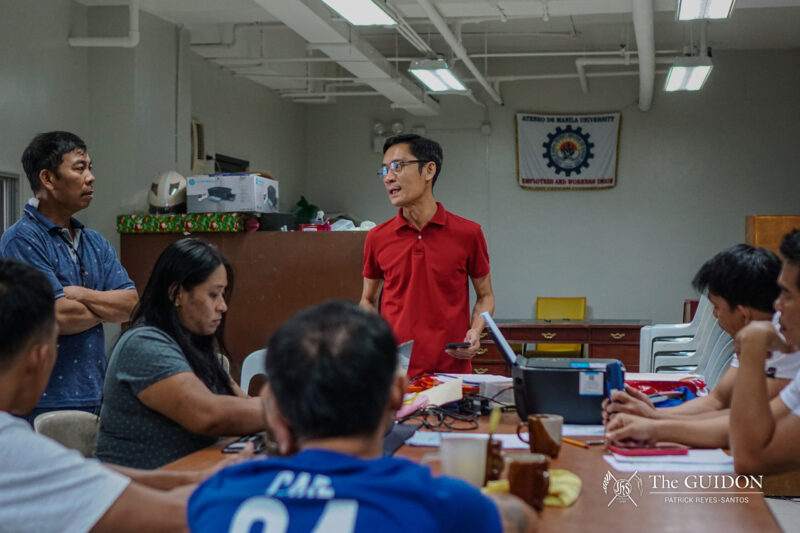PSYCHOLOGY DEPARTMENT Chair Mira Alexis Ofreneo, PhD led “A Talk on Violence Against Women on Campus” at CTC 413 on November 24. In the event, Ofreneo discussed the prevalence of sexual violence, the importance of consent, and what students can do to deter the culture of silence regarding rape and assault.
“We’re starting this off because our school is now, more than any point in time, actively engaged in confronting [sexual violence],” said Ofreneo.
Throughout the talk, she used rape, as well as sexual harassment, as a case in point instead of focusing on power inequality because she views power relation as often too broad an issue.
Sexual violence as ‘phenomena’
A Social Weather Stations (SWS) 2016 survey conducted in Quezon City revealed that 1 out of 7 women are harassed at least once a week, and 1 out of 7 men admit to having harassed someone.
Furthermore, the study showed that 3 out of 5 women will experience harassment at least once in their lifetime. Ofreneo noted that this does not even account close to the actual data since most sexual harassment cases are not reported.
According to SWS, wolf-whistling, lascivious language, groping, rubbing, stalking, catcalling, exhibitionism, and public masturbation are considered as harassment.
However, another form of sexual harassment that is subtle in presence is the creation of a hostile environment.
“What could be perceived as obscene—that’s the part where it causes confusion. People who are reported as having harassed students would say, ‘We didn’t mean anything by it’ [or] ‘It was just a joke’ so the interpretation is quite different,” she said.
“But the bottomline of sexual harassment is how the person receives it. It’s the subjective experience of the person. If the person feels harassed, the person is harassed. That’s how it’s determined,” she added.
Ofreneo also mentioned that rape is an act not limited to strangers, but it could also be committed by a friend, a partner, an acquaintance, or a classmate.
Gender norms, roles
Ofreneo recalled the time when women around the world generally had limited rights and low societal positions in centuries past. She said that while this is not apparent today, the measure of violence still hasn’t been addressed.
“There [seems to be] very little gender gap [in the Philippine context today]. But they’re only measuring economic participation, political participation, and participation in school. But what about violence?” she said.
Although the rise of feminism had given voice to women’s oppression, Ofreneo noted that the misconceptions surrounding this movement still made it difficult for people to embrace its purpose.
“Feminism became a bad word. It was the F word. No one wanted to be identified as a feminist. [Feminism] is not to blame men, but to recognize the disparity between men and women,” she said.
Ofreneo stated how language has been changed to be more inclusive. What was formerly known as Violence Against Women (VAW) is now termed as Gender-Based Violence (GBV).
“The language of gender-based violence is made to include everyone. With this term, it accounted for men also experiencing violence, because men do get raped. Men can be raped by women. Men can be raped by men,” she said.
Ofreneo claimed that gender relations are rooted in gender roles, norms, and expectations embedded in society. She elaborated that from early on, girls and boys are taught differently; while girls are taught to maintain their virginity and not want sex, boys are put on a pedestal for having sex.
She pointed out that unlike men, women don’t talk about matters such as sex and masturbation. It would even be deemed “unthinkable” for them to do so.
Changing the script
Ofreneo stressed that in sex, there should always be mutual desire, consent, and pleasure. Consent demands two things: There must be both a capacity to express consent and the expression of consent. The former involves one’s level of consciousness, whether he or she is too intoxicated to give consent, while the latter requires the actual, verbal utterance of consent.
Ofreneo said that what stops women from uttering consent is that women are not trained to think about sex in the first place due to the “beliefs of one’s gender which has something to do with how they express themselves.” As such, there are two very different scripts for men and women.
“Men are taught to ask for sex, but then they’re not told to ask for consent. There’s a missing line in the script,” she said.
“The scripts are part of the norm [and] structure. [What we want is] to see what kind of script will not lead to violence. The situation here is the lack of scripts. This is also the same script that blocks men from speaking out,” she added.
Ofreneo also discussed how often reports of assault and rape are minimized and dismissed, even among family members of the victim. A perpetrator within the family will even be “colluded” to be kept safe. Reports are not sent because of the stigma behind it.
“A culture of silence perpetuates rape. Unless we talk about it, nothing will happen. If we don’t talk about it, we don’t recognize it as a problem. If we don’t report it, no one will be accountable,” she said.
To break the culture of silence, Ofreneo said we should listen to people who speak up about rape and change the script of gender relations.
“This we can do: we can talk, we can speak up, we can listen. If we can ask people who’ve experienced it to talk, that would make such a huge difference. When we hear people’s narratives, we are able to connect to an issue. And then we can try to change the script,” she said.
According to Ofreneo, it all boils down to three main courses of action. First, check if the person can give consent. Second, ask for consent. Third, if consent is not given, stop.
“No means no. Not saying yes means no. Not saying anything means no. Only yes means yes,” she concluded.







